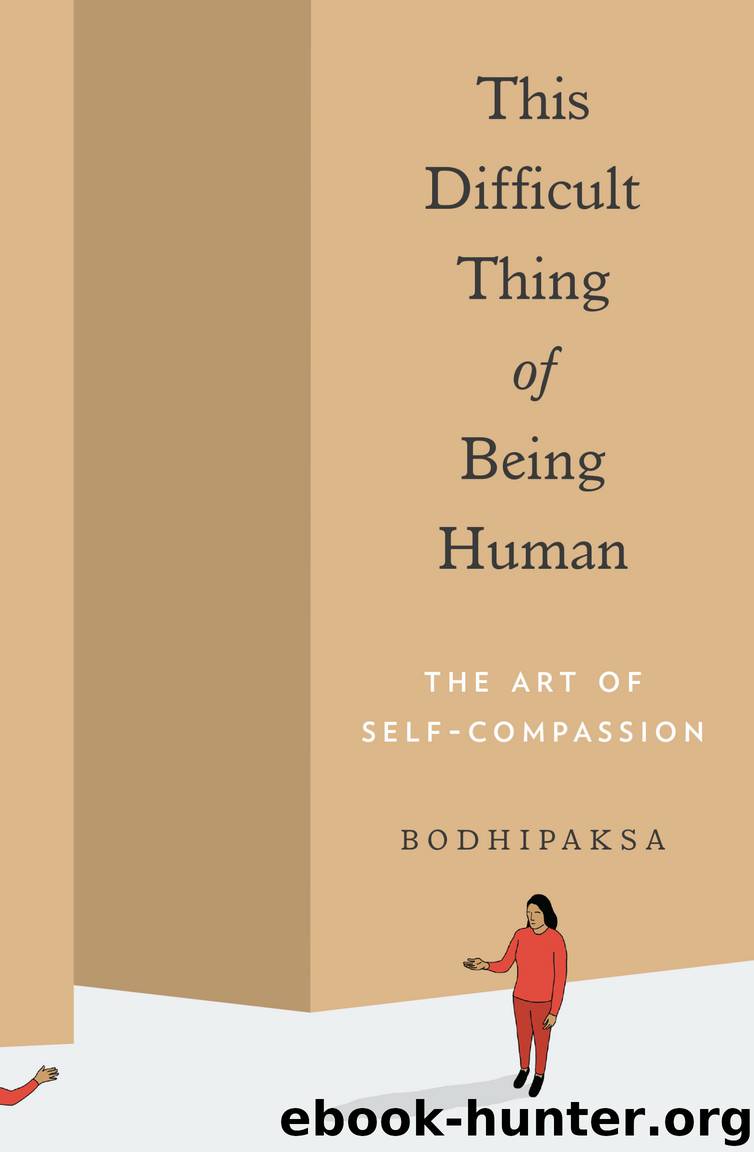This Difficult Thing of Being Human by Bodhipaksa

Author:Bodhipaksa
Language: eng
Format: epub
Publisher: Parallax Press
Published: 2019-11-25T16:00:00+00:00
Distinguishing Feelings and Volitions
I was surprised when I first learned that the ancient Indian psychological tradition had no word that corresponded to the English word “emotion.” How can there be no word for something that’s so basic to our experience? Eventually I came to realize that Buddhist psychology tends to be precise, and that the word “emotion” is not. In fact, there is no agreement among scientists and psychologists about what emotion is, and some of them say that the word is too ambiguous to be useful. I tend to agree.
Two terms that Buddhism uses, and contrasts, are “feelings” and “volitions.” As we’ve seen, feelings are pleasant or unpleasant sensations arising in the body. They are, in effect, signals from ancient parts of the brain, alerting us to potential benefits or threats. The word “volition” comes from the Latin root volere, meaning “to want.” Wants are desires, or wishes. Our volitions suggest how we should act in response to feelings. Our feelings tell us about potential threats or benefits, while volitions direct us to particular courses of action in response to those.
Feelings, as I’ve said, have no moral status. They’re not choices, and are therefore not ethically significant. As sensations, they can be hedonically pleasant or unpleasant but they can’t be morally right or wrong. And so we can practice accepting them and allowing them to be present. Our volitions, on the other hand, are a form of internal action, and they prompt us to take action in the world. They themselves, and the actions they prompt us to take, can either cause or reduce suffering in ourselves and others. Therefore they do have ethical significance. While they may often be habitual and automatic, we have the ability to choose whether to reinforce them or to counter them. We can choose whether to act on them or to abstain from doing so. That, essentially, is what ethics is about: choosing volitions that create long-term benefits for ourselves and others, rather than those that create suffering.
In common parlance we may refer to unskillful volitions such as anger, hatred, and craving, or skillful volitions such as patience, kindness, or appreciation, as “feelings,” but from a Buddhist point of view they aren’t. And the word “emotion” includes both true feelings and volitions, which is why it’s too ambiguous to be a useful term. Again, when we’re talking about being mindful of feelings, we’re talking about observing pleasant and unpleasant sensations in the body, not about observing volitions, or desires.
Because of the different nature of feelings and volitions, we don’t treat these phenomena the same way. We work to accept all feelings, whether they’re pleasant or unpleasant. Accepting them means not reacting to them. It means giving them space to exist for as long as they’re passing through us. With volitions, on the other hand, we need to be mindful of whether they are likely to cause suffering or not. We need to learn to drop volitions that are unhelpful, and cultivate those that lead to us living more mindfully, empathically, and compassionately.
Download
This site does not store any files on its server. We only index and link to content provided by other sites. Please contact the content providers to delete copyright contents if any and email us, we'll remove relevant links or contents immediately.
| Animals | Cities & Architecture |
| Comics & Manga | Fantasy & Science Fiction |
| Fashion | Flowers & Landscapes |
| Humorous | Mandalas & Patterns |
| Religious & Inspirational | Science & Anatomy |
On Writing A Memoir of the Craft by Stephen King(4224)
The Doodle Revolution by Sunni Brown(4054)
A Simplified Life by Emily Ley(3583)
Mummy Knew by Lisa James(3176)
Marijuana Grower's Handbook by Ed Rosenthal(3128)
Paper Parties by Erin Hung(3048)
Better Homes and Gardens New Cookbook by Better Homes & Gardens(2965)
Figure Drawing for Artists by Steve Huston(2805)
Draw Your Day by Samantha Dion Baker(2717)
The Genius of Japanese Carpentry by Azby Brown(2618)
Japanese Design by Patricia J. Graham(2563)
Lions and Lace by Meagan Mckinney(2498)
Dangerous Girls by Haas Abigail(2483)
The Curated Closet by Anuschka Rees(2395)
Zero to Make by David Lang(2351)
How to Make Your Own Soap by Sally Hornsey(2346)
The Wardrobe Wakeup by Lois Joy Johnson(2240)
The Code Book by Simon Singh(2222)
The Checklist Manifesto by Atul Gawande(2209)
